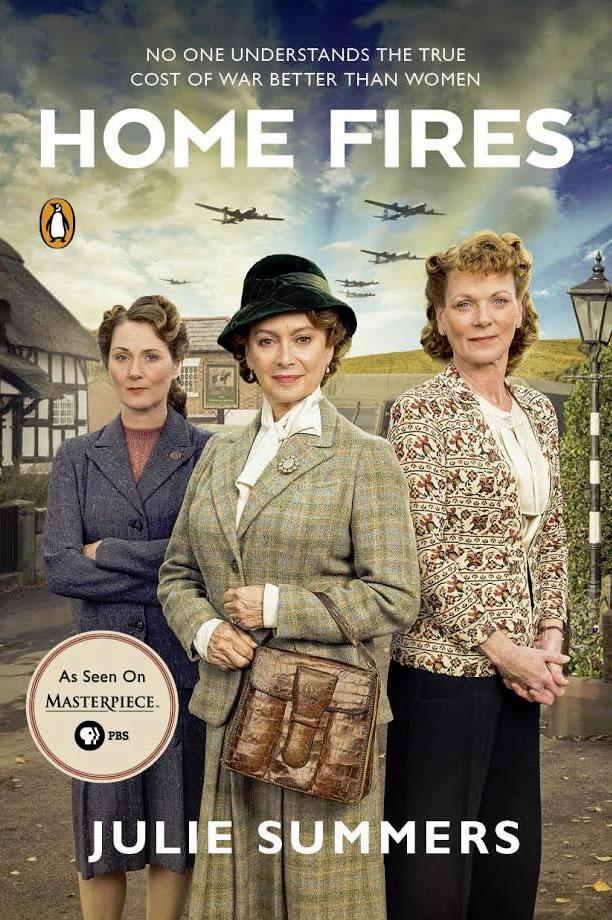“magnificent new biography”
Daily Telegraph
A note for American visitors to my website
A very warm welcome to the home of Home Fires and my other non-fiction books. I hope there will be no confusion between the TV drama series soon to play out on your screens and my book of the same title. In the UK we kept the original title Jambusters for the book, while the series, written by script-writer Simon Block, is called Home Fires. The story of how Jambusters became Home Fires is told in the first chapter of the US edition. The book itself is an historical non-fiction account of how the Women’s Institute of England and Wales pulled together in the early months of the Second World War and overcame bureaucratic logjams, civil servants’ antipathy and the Phoney War. It was so highly regarded that in 1942 there was an official visit from First Lady Eleanor Roosevelt to a WI in Kent, southern England. She was accompanied by Lady Denman of the Women’s Land Army and the WI, Mrs Churchill, Lady Reading of the Women’s Voluntary Service and sixty members of the press. As a result of the visit was the WI was presented with nine canning vans with Ford V-Chassis to help with fruit preservation, and some 500 canning machines.

The following year Princess Elizabeth joined her mother, The Queen (later the Queen Mother) and her grandmother, Queen Mary, as a member of the WI. This was no parochial village set-up but a great national organisation of women who had enormous power which they wielded sparingly but with judicious precision. Those are the stories you will read in my book Home Fires, published by Penguin USA. What you will see on PBS is Simon Block’s brilliant drama featuring favourites Samantha Bond and Francesca Annis, as well as some superb young British talent. He has taken the DNA of my book and created a fictional village, complete with Women’s Institute, to tell the story of the Second World War from the women’s perspective. As the series progresses there are hints of what will develop in Series 2 as the war progresses. But for now, I hope you enjoy Series 1 and the non-fiction book I wrote in 2012.
When I set out to write a history of the Women’s Institute in wartime I had in mind an historical overview with anecdotes from village institutes about jam-making, vegetable growing, salvage-collecting, knitting and other activities we associate with the Second World War. As I have gone along I have realised that this is not what lies at the heart of this book. There are many top-down biographies of the Women’s Institute but what I was interested in was the bottom-up story, the ordinary countrywomen who were at the heart of the village institutes. What has grown out of my research is a picture of the remarkable role played by ordinary women in rural Britain during the war. Unpaid, unsung, to a large extent uncomplaining, these women quietly and often with humour, made the countryside tick.
This book is a tribute to these women. Some were grand county ladies, others were farm labourers’ wives and daughters. The majority were somewhere in between. In the institute there was no differentiation between their backgrounds. Though it would be foolish to suggest that all social boundaries were broken, they were, however, porous. The story of how they all buckled to and helped out is of more interest to me than who was the president or secretary on any given committee. The WI bound them together. Sybil Norcott, a WI member for nearly seventy years, summed it up: ‘The WI is in my heart. It is in all our hearts. It is a way of life.’
The Second World War was the backdrop to the lives of Britons for six years. For children who were five or six at the outbreak it shaped their childhoods; for young women it coloured their adolescence and the formative years of their adulthood; for middle-aged and older women it came as an all too grim reminder of the Great War that had ended just a generation earlier and cost the country nearly a million lives.
The title for this book, Jambusters, was the inspired suggestion of my brother, Tim. He deserves credit for a very clever pun, though I suspect he did not know at the time he suggested it just how apposite it would be. During the war the WIs bust logjams, circumvented bureaucracy and improvised in many different ways. They wrote a major report on evacuation, were involved in advising eleven ministries, including the Treasury, and as a result influenced government thinking about children’s health and education, housing and post-war reconstruction. They ran canteens for troops, baked pies for farm workers, and collected hundreds of tons of rosehips and herbs for the pharmaceutical industry. By their joint effort, members contributed millions of knitted garments to keep troops and refugees in Europe warm. They made 12,000,000 lbs (5,445,000 kilograms) of jam and preserves, helped to set up over 1000 pig clubs and made more than 2000 fur-lined garments for Russia. And in amongst all this major activity they sang, put on plays and organised parties to entertain their villages and keep their spirits up. The Second World War was the WI’s finest hour.
Related media

BBC One Breakfast, 27 February 2013 – Julie and WI member Sybil Norcott talk about the unsung heroes of the Women’s Institute

BBC London 94.9, 25 March 2013 – Julie talks about the Women’s Institute in the Second World War with Jo Good.

Gransnet.com April 2013 – “Hitler confirmed dead. Jack sows marigolds.” Julie recounts the discovery of Edith Jones’ diaries and their importance as the ‘golden thread’ in Jambusters.


